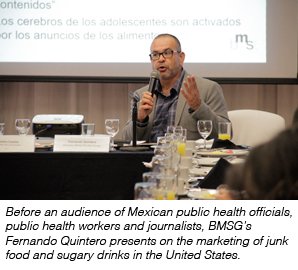Talking about junk food marketing to kids: Is the health argument enough?
by: Fernando Quintero
posted on Thursday, October 16, 2014
I began this post a few weeks ago from my hotel room in Mexico City, where I was invited by a local nonprofit consumer group to speak about the impact of junk food and sugary beverage marketing to children — a topic I’ve learned a lot about since I began conducting communications strategy trainings to public health advocates working to combat diabetes and other nutrition-related diseases through public policy.
“Diabetes is one of the top two causes of death in the country, alongside (and occasionally overlapping with) heart disease,” according to a 2013 Economist report that cited figures from the Mexican Diabetes Federation. Diabetes alone kills as many as 70,000 people a year in Mexico, and more than 40,000 new cases are being diagnosed each year.
Mexico’s prevalence of diabetes has now far surpassed that of the U.S., with one of the highest rates in the western hemisphere. Much of the spike in diabetes is attributed to increased consumption of soda and other cheap sugary drinks, as well as mass-marketed snack foods, which have replaced home-cooked meals, along with fresh fruits and vegetables.
 While Mexico’s President Enrique Pea Nieto has become known worldwide as a leader in the fight against diabetes following the passage of a national soda tax and other reforms, my hosts, El Poder del Consumidor (The Power of the Consumer), have joined other Mexican health leaders and advocacy groups in calling for stronger regulations, particularly around childhood marketing. Offering an international perspective, I was asked to speak to legislators at the Chamber of Deputies and at a news conference in support of stricter marketing guidelines.
While Mexico’s President Enrique Pea Nieto has become known worldwide as a leader in the fight against diabetes following the passage of a national soda tax and other reforms, my hosts, El Poder del Consumidor (The Power of the Consumer), have joined other Mexican health leaders and advocacy groups in calling for stronger regulations, particularly around childhood marketing. Offering an international perspective, I was asked to speak to legislators at the Chamber of Deputies and at a news conference in support of stricter marketing guidelines.
At both events, I found it compelling how Mexican health advocates framed the problem of junk food marketing to children as a human rights issue. “Deceitful marketing directed at children violates their right to health and their right to not be manipulated or deceived,” Alejandro Calvillo Unna, director of El Poder del Consumidor and a leading health advocate in Mexico, told audiences.
In the U.S. advocates have focused largely on food marketing’s health consequences, and to a lesser extent, the exploitative nature of marketing to kids — especially younger children, who are unable to understand the persuasive intent of advertising.
Calvillo also cited provisions in the Mexican Constitution, which outlines special protection and care for children including the duty to promote respect for the dignity of all children and the full exercise of their rights. Mexico’s constitution also provides that children have the right to satisfy their nutritional, health, educational, and recreational needs. Several laws have been enacted in order to implement this mandate, most importantly the federal Law on the Protection of the Rights of Children and Adolescents.
Now, I’m no expert in constitutional law, U.S. or otherwise, but in the U.S., children are generally afforded the same constitutional rights as adults. Like every other citizen, children have the right to due process and to legal counsel, as well as protection against cruel and unusual punishment and unreasonable searches and seizures.
However, the law also recognizes that children aren’t physically or emotionally mature enough to handle legal activities like drinking or voting. The law reconciles this idea by implementing “ages of majority” designed to define when a person has the ability to responsibly exercise his or her rights. These usually vary by state, but they govern everything from the right to drive to the right to marry.
Wouldn’t it be great if U.S. law also recognized that children under a certain age aren’t mature enough to discern marketing and advertising from other content? Would it be advantageous for health advocates to follow Mexico’s lead and reframe harmful food and beverage marketing as a violation of children’s fundamental rights?
Some (non-junk) food for thought.
What do you think? Let us know at info@bmsg.org, or on Twitter @BMSG or Facebook.



